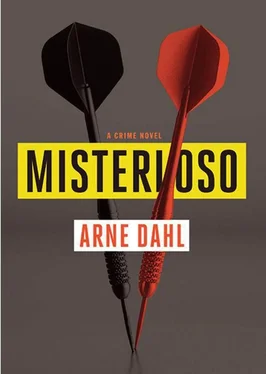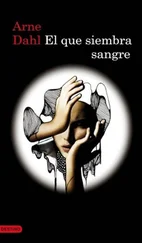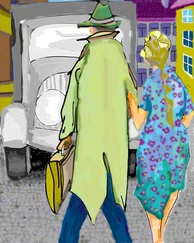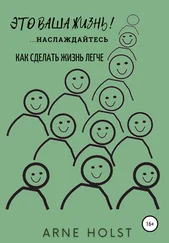“Okay. See you in the morning.”
“Sure, see you,” said Jorge Chavez as he went over to the shuddering printer.
On the morning of April 2, Paul Hjelm sat at the breakfast table looking at his family with new eyes. Yesterday a destroyed man had consumed breakfast; today a resurrected man was telling them about his new situation. They received his news about being transferred to the city with moderate enthusiasm.
“That’s not really surprising,” said Danne. It seemed to Hjelm that his son was regarding him with the same expression that he himself had displayed at the sight of his wife’s menstrual blood a few days earlier. “You’re the Hallunda hero, after all.”
“Of course, it’s a promotion to get out of this ghetto,” said Tova, leaving the room before Hjelm could recover enough to ask her where she’d heard that word.
From him? Had he been spreading a bunch of shit around without even being aware that he was doing it? Had he corrupted the minds of the next generation, which had more experience than his own in dealing with what was foreign, in becoming familiar with it, in learning not to fear it?
Look deep into your heart , Hjelm.
It had been exposed for a second, but only a second, and now he had to hide the sight behind tons of work. And no one in his family had a clue about how close to the abyss he had come. They saw the hero; he saw the corpse.
He had been saved, but he was also being transferred. Maybe an officer from an immigrant background would take his place in Fittja, and maybe the Huddinge police would benefit immeasurably from his replacement.
The children had left, and just as he was about to discuss it with Cilla, she too disappeared.
When he got up to leave for the city, he felt lonelier than he’d ever felt. But also ready-to become someone else.
Maybe he sensed that this case was going to be different from any he’d previously encountered.
Something foreign.
He picked up the newspaper and glanced at the headline: DOUBLE MURDER OF TOP BUSINESSMEN. ITALIAN MAFIA IN STOCKHOLM?
He sighed heavily and left.

Cool breezes that couldn’t decide whether they belonged to the forces of winter or spring rippled the surface of the water. Slightly stronger swells lapped back and forth, shoving some of the boats a few extra feet. About a dozen small vessels were bobbing up and down on Neptune’s shoulders, making dots of various sizes on the water of Stora Värtan, almost all the way out to the horizon.
“A horrible affair,” repeated the man wearing a captain’s cap. “For both of them. Two of our most outstanding members. What are we going to do when we can’t even feel safe in our own homes? Will every decent citizen have to hire bodyguards?”
Hjelm and the man were standing on one of six long piers that stretched out from shore toward the breakwater. Together they formed the Viggbyholm small-boat marina. Only a few boats were actually in the water next to the piers, but on land a frenzy of activity was under way as boats were readied for the new season. Men garbed in work clothes were rushing around, and the heavy, stifling stink of epoxy and varnish rose up from the roaring electric sanders.
“So this is where Bernhard Strand-Julén’s boat should be docked?” said Hjelm, pointing down at the water.
“Yes, and Daggfeldt’s should be over there, at pier three. It’s still a little too early to launch the boats. I must say that it was a real shock to open the paper this morning.”
“It was for me too,” said Hjelm.
“Such headlines! Is a Sicilian mafia hitman really planning to eradicate all the business leaders in Sweden? Or as the other paper reported-has the Baader-Meinhof terrorist group resurfaced? It seems incredible. And what are the police doing about it?”
“This is what we’re doing about it,” said Hjelm the police officer as he turned back to shore.
“I didn’t mean that as a criticism,” said the man, following with a somewhat swaggering gait. “I just meant, what can the police do against forces like that?”
“This is what we’re doing about it,” repeated Hjelm.
They went inside the imposing building on Hamnvägen that housed the boat club. The man showed Hjelm into his office. He sat down at his desk, but his thoughts were elsewhere. He picked up a letter opener and sliced open an envelope. Hjelm cleared his throat.
“I’m sorry,” said the man, putting down the letter opener and envelope. “I’m not feeling very well.”
“So did you know them personally?”
“Not really. No more than other members of the club. We talked a bit about boats, about good sailing areas, winds, weather forecasts. Things like that.”
“Did they know each other? Did they spend time together here at the club?”
“I don’t really know. They were very different kinds of skippers, so I’m inclined to think that they didn’t. Daggfeldt was a family sailor; he always took Ninni and his children along when he went sailing in the Maxi . I remember that his older daughter, she must be eighteen or nineteen, was getting a bit tired of it all, and the son, who’s a couple of years younger, wasn’t particularly amused either. And Ninni would get seasick before she even left the pier. But she was always cheerful and enthusiastic. ‘Hearty but seasick,’ Daggfeldt used to say with a laugh.
“But it was important to him to have his whole family along. That was probably the only time they were all together. Though things could get a bit testy out among the skerries. That was my impression, at least.”
Hjelm was surprised at how much this man had been able to learn from a few chats about sailing areas and weather forecasts. “What about Strand-Julén?” he asked, to keep him talking.
“That was a whole different story. A serious-minded skipper. He had one of those Swan boats, not the large kind, so it could still squeeze into the small-boat marina. Always with a crew that seemed very professional, two or three young men with the best equipment, different each time. Fancy new clothes, the best brands.”
“Different each time?”
“The crew. But they always looked well trained. Highly skilled, the type of guys who take part in the Whitbread Round the World Race, just to mention the one that everybody would know. But younger, of course. They had a certain look about them. Like swimmers do-you know how they all have the same body type.”
“In this case very young and blond and tanned? And the equipment was newly purchased each time?”
The man blinked a few times and frowned. Probably at his own loose tongue. But his reaction was a little too strong for that. There’s more going on here , thought Hjelm. Better lay it on thick .
“Okay,” he said, taking a chance. “I don’t give a shit about whether Bernhard Strand-Julén was a pedophile and liked to have thirty-five young boys in-what should we say, the sack?-at the same time. But do you have any idea where I could find any of those boys? The man is beyond the reach of the law now-he’s untouchable.”
“His reputation isn’t untouchable. Standing in judgment over a dead man, and so on. And he does have a wife, you know.”
“It’s possible,” ventured Hjelm again, “that you never actually played the role of pimp. But if you don’t give me a little more information, I’m going to see that every detail of the situation is investigated. Homosexual procurement activities, possibly involving minors, at one of Sweden’s most prestigious boat clubs. So let’s try again. The rumor is enough. You know that, Mr. Lindviken.”
The man chewed on his knuckles. The interview had taken a most unpleasant turn.
Читать дальше












